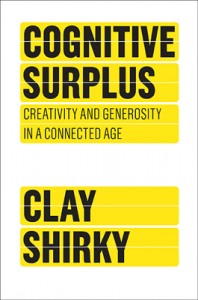 About Cognitive Surplus
About Cognitive Surplus
• Hardcover: 256 pages
• Publisher: The Penguin Press (June 10, 2010)
For decades, technology encouraged people to squander their time and intellect as passive consumers. Today, tech has finally caught up with human potential. In Cognitive Surplus, internet guru Clay Shirky forecasts the thrilling changes we will all enjoy as new digital technology puts our untapped resources of talent and good will to use at last.
Since we Americans were suburbanized and educated by the postwar boom, we’ve had a surfeit of intellect, energy, and time—what Shirky calls a cognitive surplus. But this abundance had little impact on the common good because television consumed the lion’s share of it – and we consume TV passively, in isolation from one another. Now, for the first time, people are embracing new media that allow us to pool our efforts at vanishingly low cost. The results of this aggregated effort range from mind-expanding – reference tools like Wikipedia – to life-saving – like Ushahidi.com, which has allowed Kenyans to sidestep government censorship and report on acts of violence in real time.
Shirky argues persuasively that this cognitive surplus – rather than being some strange new departure from normal behavior – actually returns our society to forms of collaboration that were natural to us up through the early 20th Century. He also charts the vast effects that our cognitive surplus – aided by new technologies – will have on 21st Century society, and how we can best exploit those effects. For instance, he acknowledges that new tech brings greater freedom to publish and hence lower quality on average. But it also allows for the sort of experimentation that produces our greatest innovations. He also assesses the transformative impact of online culture, which is by definition more transparent than traditional management structures. This expectation of openness is migrating inevitably into the offline world, where decision-making and other processes will become more apparent to the people they affect. Similarly, our sense of value is being altered by the new economics of cognitive surplus, which often eschew cash payments in favor of other rewards like the sense of autonomy, competence, and community that we rarely get from paying jobs.
The potential impact of cognitive surplus is enormous. As Shirky points out, Wikipedia was built out of roughly 1% of the man-hours that Americans spend watching TV every year. Wikipedia and other current products of cognitive surplus are only the iceberg’s tip. Shirky shows how society and our daily lives will be improved dramatically as we learn to exploit our good will and free time like never before.
 About Clay
About Clay
Clay Shirky teaches at the Interactive Telecommunications Program at NYU, where he researches the interrelated effects of our social and technological networks. He has consulted with a variety of groups working on network design, including Nokia, the BBC, Newscorp, Microsoft, BP, Global Business Network, the Library of Congress, the US Navy, the Libyan government, and Lego. His writings have appeared in the New York Times, the Wall Street Journal, the Times of London, Harvard Business Review, Business 2.0, and Wired.
Connect with Clay on his website.
Clay’s TLC Book Tours TOUR STOPS
Tuesday, June 22nd: Being Peter Kim
Thursday, June 24th: Graywolf’s SEO Blog
Tuesday, June 29th: Convince and Convert
Wednesday, June 30th: Library Queue
Thursday, July 8th: Social Media Explorer
Wednesday, July 14th: Debbie Weil
Thursday, July 15th: Beth’s Blog
Monday, July 19th: A Whole Lotta Nothing
Wednesday, July 21st: Web Strategy by Jeremiah Owyang
Thursday, July 22nd: Six Pixels of Separation
Monday, July 26th: Community Guy
Wednesday, July 28th: Citizen Marketer 2.1
Thursday, July 29th: Nine By Blue
Tuesday, August 3rd: Socialbrite
Wednesday, September 8th: Leigh’s Blitherings
Date TBD: Chris Brogan